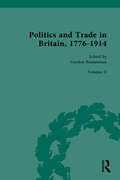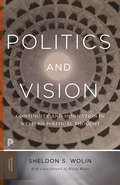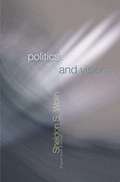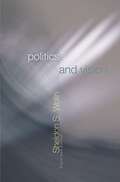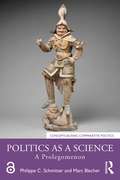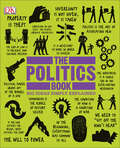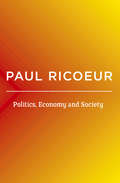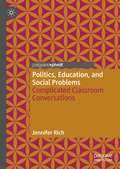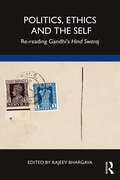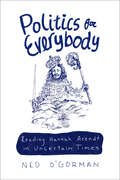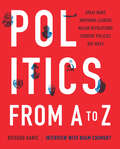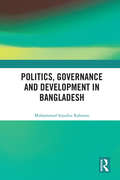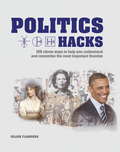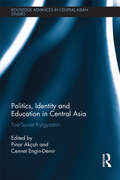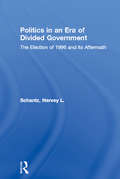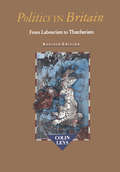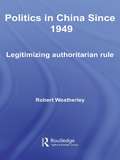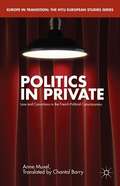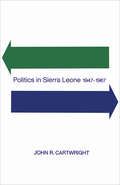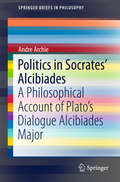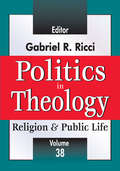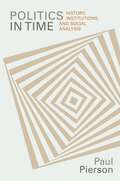- Table View
- List View
Politics and Trade in Britain, 1776-1914: Volume II: 1841-1879
by Gordon BannermanThis volume takes up the story of exacerbated political divisions from 1841 onwards, with a clearer demarcation in political life caused at least partly by commercial policy considerations. Ultimately, the success of free trade policies, implemented by Sir Robert Peel after 1841, saw the reconfiguration of political parties and had lasting effects and impact on party politics. Yet in the period up to 1879, there was a broad consensus on maintaining the free trade settlement of 1846. This period, often seen as a ‘free trade interlude’ book-ended by a far more complex range of opinions, policies, and strategies surrounding commercial policy, was characterised by British manufacturing expansion, deeper penetration of foreign and colonial markets, and the adoption of freer trade policies by foreign nations. Ultimately, none of these developments lasted in the long term. By the end of 1879, commercial policy was again controversial. The type of sources in this volume include correspondence from The Panmure Papers, the Later Correspondence of Lord John Russell, and diary material from Lord Ashley and John Bright. There is also a considerable body of material from newspapers, including the Morning Chronicle, Northern Star, Manchester Guardian, and Liverpool Mercury. Manuscript materials from Richard Cobden, John Benjamin Smith, and Lord John Russell among others are also present.
Politics and Vision: Continuity and Innovation in Western Political Thought
by Wendy Brown Sheldon S. WolinPolitics and Vision is a landmark work by one of the great thinkers of the twentieth century. This is a significantly expanded edition of one of the greatest works of modern political theory. Sheldon Wolin's Politics and Vision inspired and instructed two generations of political theorists after its appearance in 1960. Substantially expanded for republication in 2004, it is both a sweeping survey of Western political thought and a powerful account of contemporary predicaments of power and democracy. In lucid and compelling prose, Sheldon Wolin offers original, subtle, and often surprising interpretations of political theorists from Plato to Rawls. Situating them historically while sounding their depths, he critically engages their diverse accounts of politics, theory, power, justice, citizenship, and institutions. The new chapters, which show how thinkers have grappled with the immense possibilities and dangers of modern power, are themselves a major theoretical statement. They culminate in Wolin's remarkable argument that the United States has invented a new political form, "inverted totalitarianism," in which economic rather than political power is dangerously dominant. In this expanded edition, the book that helped to define political theory in the late twentieth century should energize, enlighten, and provoke generations of scholars to come. Wolin originally wrote Politics and Vision to challenge the idea that political analysis should consist simply of the neutral observation of objective reality. He argues that political thinkers must also rely on creative vision. Wolin shows that great theorists have been driven to shape politics to some vision of the Good that lies outside the existing political order. As he tells it, the history of theory is thus, in part, the story of changing assumptions about the Good. Acclaimed as a tour de force when it was first published, and a major scholarly event when the expanded edition appeared, Politics and Vision will instruct, inspire, and provoke for generations to come.
Politics and Vision: Continuity and Innovation in Western Political Thought
by Sheldon S. WolinThis is a significantly expanded edition of one of the greatest works of modern political theory. Sheldon Wolin's Politics and Vision inspired and instructed two generations of political theorists after its appearance in 1960. This new edition retains intact the original ten chapters about political thinkers from Plato to Mill, and adds seven chapters about theorists from Marx and Nietzsche to Rawls and the postmodernists. The new chapters, which show how thinkers have grappled with the immense possibilities and dangers of modern power, are themselves a major theoretical statement. They culminate in Wolin's remarkable argument that the United States has invented a new political form, "inverted totalitarianism," in which economic rather than political power is dangerously dominant. In this new edition, the book that helped to define political theory in the late twentieth century should energize, enlighten, and provoke generations of scholars to come. Wolin originally wrote Politics and Vision to challenge the idea that political analysis should consist simply of the neutral observation of objective reality. He argues that political thinkers must also rely on creative vision. Wolin shows that great theorists have been driven to shape politics to some vision of the Good that lies outside the existing political order. As he tells it, the history of theory is thus, in part, the story of changing assumptions about the Good. In the new chapters, Wolin displays all the energy and flair, the command of detail and of grand historical developments, that he brought to this story forty years ago. This is a work of immense talent and intense thought, an intellectual achievement that will endure.
Politics and Vision
by Sheldon S. WolinThis is a significantly expanded edition of one of the greatest works of modern political theory. Sheldon Wolin's Politics and Vision inspired and instructed two generations of political theorists after its appearance in 1960. This new edition retains intact the original ten chapters about political thinkers from Plato to Mill, and adds seven chapters about theorists from Marx and Nietzsche to Rawls and the postmodernists. The new chapters, which show how thinkers have grappled with the immense possibilities and dangers of modern power, are themselves a major theoretical statement. They culminate in Wolin's remarkable argument that the United States has invented a new political form, "inverted totalitarianism," in which economic rather than political power is dangerously dominant. In this new edition, the book that helped to define political theory in the late twentieth century should energize, enlighten, and provoke generations of scholars to come. Wolin originally wrote Politics and Vision to challenge the idea that political analysis should consist simply of the neutral observation of objective reality. He argues that political thinkers must also rely on creative vision. Wolin shows that great theorists have been driven to shape politics to some vision of the Good that lies outside the existing political order. As he tells it, the history of theory is thus, in part, the story of changing assumptions about the Good. In the new chapters, Wolin displays all the energy and flair, the command of detail and of grand historical developments, that he brought to this story forty years ago. This is a work of immense talent and intense thought, an intellectual achievement that will endure.
Politics as a Science: A Prolegomenon (Conceptualising Comparative Politics)
by Philippe C. Schmitter Marc BlecherIn Politics as a Science, two of the world's leading authorities on Comparative Politics, Philippe C. Schmitter and Marc Blecher, provide a lively introduction to the concepts and framework to study and analyze politics. Written with dexterity, concision and clarity, this short text makes no claim to being scientific. It contains no disprovable hypotheses, no original collection of evidence and no search for patterns of association. Instead, Schmitter and Blecher keep the text broadly conceptual and theoretical to convey their vision of the sprawling subject of politics. They map the process in which researchers try to specify the goal of the trip, some of the landmarks likely to be encountered en route and the boundaries that will circumscribe the effort. Examples, implications and elaborations are included in footnotes throughout the book. Politics as a Science is an ideal introduction for anyone interested in, or studying, comparative politics. “The Open Access version of this book, available at http://www.taylorfrancis.com/doi/view/10.4324/9781003032144, has been made available under a Creative Commons Attribution-Non Commercial-No Derivatives 4.0 license.”
Politics as Radical Creation
by Christopher HolmanPolitics as Radical Creation examines the meaning of democratic practice through the critical social theory of the Frankfurt School. It provides an understanding of democratic politics as a potentially performative good-in-itself, undertaken not just to the extent that it seeks to achieve a certain extrinsic goal, but also in that it functions as a medium for the expression of creative human impulses. Christopher Holman develops this potential model through a critical examination of the political philosophies of Herbert Marcuse and Hannah Arendt.Holman argues that, while Arendt and Marcuse's respective theorizations each ultimately restrict the potential scope of creative human expression, their juxtaposition - which has not been previously explored - results in a more comprehensive theory of democratic existence, one that is uniquely able to affirm the creative capacities of the human being. Yielding important theoretical results that will interest scholars of each theorist and of theories of democracy more generally, Politics as Radical Creation provides a valuable means for rethinking the nature of contemporary democratic practice.
The Politics Book: Big Ideas Simply Explained (DK Big Ideas)
by DKLearn about how the world of government and power works in The Politics Book.Part of the fascinating Big Ideas series, this book tackles tricky topics and themes in a simple and easy to follow format. Learn about Politics in this overview guide to the subject, great for novices looking to find out more and experts wishing to refresh their knowledge alike! The Politics Book brings a fresh and vibrant take on the topic through eye-catching graphics and diagrams to immerse yourself in. This captivating book will broaden your understanding of Politics, with:- More than 100 groundbreaking ideas in the history of political thought- Packed with facts, charts, timelines and graphs to help explain core concepts- A visual approach to big subjects with striking illustrations and graphics throughout- Easy to follow text makes topics accessible for people at any level of understandingThe Politics Book is a captivating introduction to the world's greatest thinkers and their political big ideas that continue to shape our lives today, aimed at adults with an interest in the subject and students wanting to gain more of an overview. Delve into the development of long-running themes, like attitudes to democracy and violence, developed by thinkers from Confucius in ancient China to Mahatma Gandhi in 20th-century India, all through exciting text and bold graphics.Your Politics Questions, Simply ExplainedThis engaging overview explores the big political ideas such as capitalism, communism, and fascism, exploring their beginnings and social contexts - and the political thinkers who have made significant contributions. If you thought it was difficult to learn about governing bodies and affairs, The Politics Book presents key information in a clear layout. Learn about the ideas of ancient and medieval philosophers and statesmen, as well as the key personalities of the 16th to the 21st centuries that have shaped political thinking, policy, and statecraft.The Big Ideas SeriesWith millions of copies sold worldwide, The Politics Book is part of the award-winning Big Ideas series from DK. The series uses striking graphics along with engaging writing, making big topics easy to understand.
Politics, Economy, and Society: Writings and Lectures
by Paul RicoeurThe philosophy of Paul Ricoeur is rarely viewed through the lens of political philosophy, and yet questions of power, and of how to live together in the polis, were a constant preoccupation of his writings. This volume brings together a selection of his texts spanning six decades, from 1958 to 2003, which together present Ricoeur’s political project in its coherence and diversity. In Ricoeur’s view, the political is the realm of a tension between “rationality” (the attempt to provide a coherent explanation of the world) and “irrationality,” which manifests itself in force and repression. This “political paradox” lies at the heart of politics, for the claim to explain the world generates its own form of violence: the more one desires the good, the more one is inclined to impose it. Ricoeur warns citizens, the guardians of democracy, against any totalizing system of thought and any dogmatic understanding of history. Power should be divided and controlled, and Ricoeur defends a form of political liberalism in which states are conscious of the limits of their power and respectful of the freedom of their citizens. Ranging from questions of power and repression to those of ethics, identity, and responsibility, these little-known political texts by one of the leading philosophers of the twentieth century will be of interest to students and scholars of philosophy, politics, and theology and to anyone concerned with the great political questions of our time.
Politics, Education, and Social Problems: Complicated Classroom Conversations
by Jennifer RichThis book offers an innovative perspective on the intersection of politics, education, and social problems. It considers how we can create social change by talking about politics and social problems in more open, direct, and inclusive ways in educational spaces. Drawing on data from a range of settings, this book closely examines how and when complicated conversations take place in classrooms, schools, and communities. The book tackles a series of hot-button, timely issues, including race, religion, politics, and gender, and turns a critical eye to schools and the communities in which they are situated; the conversations adults have—and pointedly ignore—with one another; and, perhaps most critically, the politics that shape our society.
Politics, Ethics and the Self: Re-reading Gandhi’s Hind Swaraj
by Rajeev BhargavaHind Swaraj by Mahatma Gandhi is arguably the greatest text to have emerged from the anti-colonial movement in India and the first to seriously challenge the cultural and civilizational premises of the colonizers’ mentality. It is also the first text in India that falls within the broad tradition of modern political philosophy, advancing a complex cluster of theses with conceptual sensitivity, analytical precision, and sustained argument. This book critically engages with Hind Swaraj and explores the fascinating and subtle dialogue set up by Gandhi between the characters of the reader and the editor. With essays from leading contemporary thinkers on Gandhi, the volume looks at themes such as Gandhi on epistemic servitude, decolonization, and intercultural translation; his complex critique of modern civilization; his views on the empire, democracy, citizenship, and violence; the normative structure of Gandhian thought; Gandhi and the political praxis of educational reconstruction; and how to read this text. An important intervention in Gandhian studies, this book will be useful for scholars and researchers of peace studies, political philosophy, Indian philosophy, Indian political thought, political sociology, and South Asian studies.
Politics for Everybody: Reading Hannah Arendt in Uncertain Times
by Ned O'GormanIn this age of nearly unprecedented partisan rancor, you’d be forgiven for thinking we could all do with a smaller daily dose of politics. In his provocative and sharp book, however, Ned O’Gorman argues just the opposite: Politics for Everybody contends that what we really need to do is engage more deeply with politics, rather than chuck the whole thing out the window. In calling for a purer, more humanistic relationship with politics—one that does justice to the virtues of open, honest exchange—O’Gorman draws on the work of Hannah Arendt (1906–75). As a German-born Jewish thinker who fled the Nazis for the United States, Arendt set out to defend politics from its many detractors along several key lines: the challenge of separating genuine politics from distorted forms; the difficulty of appreciating politics for what it is; the problems of truth and judgment in politics; and the role of persuasion in politics. O’Gorman’s book offers an insightful introduction to Arendt’s ideas for anyone who wants to think more carefully
Politics from A to Z
by Richard GanisDeepen your understanding of how politics work, and why they matter, with this timely guide. Politics from A to Z provides an up-to-date, thoroughly researched glossary of political topics spanning ancient Greece to contemporary America. Featuring an introductory interview with Noam Chomsky, Politics from A to Z is ideal for anyone interested in politics, from beginners to scholars. With detailed entries, visual references, and useful timelines, Politics from A to Z introduces the influential figures and ideas that have shaped politics, from the American Revolution to Zionism.
Politics, Governance and Development in Bangladesh
by Muhammad Sayadur RahmanThis book explores the relationship between bureaucrats and elected politicians in Bangladesh and discusses how this impacts governance and development in the country from an empirical perspective. It looks at the interplay of politics and bureaucracy in ancient societies, western democracies and in the developing world while highlighting the uniqueness of the Bangladesh experience and its indigenous contexts of local governance. The author presents a historical overview of the nature of political development, shift of regimes in Bangladesh, and the role of various agents and stakeholders. Through a detailed study, the book provides an analytical and theoretical framework to understanding the linkages between politics and bureaucracy, governance and development in South Asia and Bangladesh, with implications for geopolitics and economic growth. This book will be of interest to scholars, researchers and students of political economy, development studies, public administration, comparative politics as well as to policymakers, bureaucrats, government bodies, and especially those concerned with Bangladesh.
Politics Hacks (Hacks)
by Julian FlandersUnderstanding the history and significance of today's political climate can be confusing and daunting. Politics Hacks is here to give you quick definitions and background on 100 key political theories from the last 1,000 years.Each idea is broken down into three stages:1/ The helicopter view, which gives you an introduction to the idea, and some context around it. 2/ The shortcut, which gives you the core elements of the theory, along with a range of examples that everyone can understand. 3/ The hack, which is a one-liner designed to stick in your memory and give you an instant grasp of the concept.Whether you quickly want to get to grips with globalization, understand the Electoral College, or understand post-truth politics, this book is the perfect way to speedy enlightenment.
Politics Hacks (Hacks Ser.)
by Julian FlandersUnderstanding the history and significance of today's political climate can be confusing and daunting. Politics Hacks is here to give you quick definitions and background on 100 key political theories from the last 1,000 years.Each idea is broken down into three stages:1/ The helicopter view, which gives you an introduction to the idea, and some context around it. 2/ The shortcut, which gives you the core elements of the theory, along with a range of examples that everyone can understand. 3/ The hack, which is a one-liner designed to stick in your memory and give you an instant grasp of the concept.Whether you quickly want to get to grips with globalization, understand the Electoral College, or understand post-truth politics, this book is the perfect way to speedy enlightenment.
Politics, Identity and Education in Central Asia: Post-Soviet Kyrgyzstan
by Pınar Akçalı Cennet Engin-DemirFocusing on the areas of politics, identity and education, this book looks at some of the most pressing and challenging issues that Kyrgyzstan faces in the post-Soviet era. It argues that Kyrgyzstan is challenged with oscillations between the old and the new on the one hand, and domestic and international on the other. The book analyses the process of post-Soviet transition in today’s Kyrgyzstan by focusing on the political elites, some of the major identity problems and educational issues. It discusses how Kyrgyzstan’s first president in the post-Soviet era had already been an exceptional leader even prior to the collapse of the Soviet Union in terms of his democratic and liberal tendencies. The book goes on to look at how identity is a major factor in the country, shaped to a large extent by genealogical factors and patron-client mechanisms on the one hand, and religious considerations on the other. Finally, it highlights how education has been perceived as a very influential agent of socialization that develops not only literacy and other skills, but also common attitudes and values that are considered essential to any society. By evaluating these three areas, the book argues that Kyrgyzstan cannot isolate itself from the demands, priorities and pressures of international actors, which sometimes are in conflict with the country’s domestic conditions. It is of interest to students and scholars of Asian Studies, Politics and International Relations.
Politics in an Era of Divided Government: The Election of 1996 and its Aftermath (Politics and Policy in American Institutions #Vol. 5)
by Harvey L. SchantzThis book describes, explains, and reflects upon the 1996 presidential and congressional elections, devoting equal coverage to three phases of the political process: the major party nominations, the general election, and the subsequent government organization. In doing so, this study links elections and governance.
Politics in Britain
by Colin LeysControversial when the first edition was published in 1983, Colin Leys' analysis of the changing face of British politics has been confirmed by events of the late 1980s. The second edition, revised throughout, is brought up to date with substantial new material on the Thatcher era.Leys provides a solid body of information on the central topics of British politics--not only the nature of political parties or the evolution of the State, but also the organization of capital and labour, corporatism, the transformations of local democracy, the sphere of law and order, and other areas seldom discussed in more orthodox texts.The book also includes new accounts of Thatcher's program of de-nationalization and of the changes to the Welfare State. Now more relevant than ever, Politics in Britain has yet to be surpassed as an introduction to its subject.
Politics in China since 1949: Legitimizing Authoritarian Rule (Routledge Contemporary China Series #Vol. 11)
by Robert WeatherleySince the victory of the 1949 revolution the incumbency of the Chinese Communist Party has been characterized by an almost relentless struggle to legitimize its monopoly on political power. During the Mao era, attempts to derive legitimacy focused primarily on mass participation in political affairs, a blend of Marxist and nationalist ideology, and the charismatic authority of Mao Zedong. The dramatic failure of the Cultural Revolution forced the post-Mao leadership to discard these discredited paradigms of legitimacy and move towards an almost exclusively performance based concept founded on market economic reform. The reforms during the 1980s generated a number of unwelcome but inevitable side effects such as official corruption, high unemployment and significant socio-economic inequality. These factors culminated ultimately in the 1989 demonstrations in Tiananmen Square and throughout China. Since Tiananmen the party has sought to diversify the basis of its legitimacy by adhering more closely to constitutional procedures in decision making and, to a certain extent, by reinventing itself as a conservative nationalist party. This probing study of post-communist revolution Chinese politics sets out to discover if there is a plausible alternative to the electoral mode or if legitimacy is the exclusive domain of the multi-party system.
Politics in Commercial Society
by Istvan Hont Béla Kapossy Michael SonenscherScholars normally emphasize the contrast between the two great eighteenth-century thinkers Jean-Jacques Rousseau and Adam Smith. Rousseau is seen as a critic of modernity, Smith as an apologist. Istvan Hont, however, finds significant commonalities in their work, arguing that both were theorists of commercial society and from surprisingly similar perspectives.<P><P> In making his case, Hont begins with the concept of commercial society and explains why that concept has much in common with what the German philosopher Immanuel Kant called unsocial sociability. This is why many earlier scholars used to refer to an Adam Smith Problem and, in a somewhat different way, to a Jean-Jacques Rousseau Problem. The two problems―and the questions about the relationship between individualism and altruism that they raised―were, in fact, more similar than has usually been thought because both arose from the more fundamental problems generated by thinking about morality and politics in a commercial society.<P> Commerce entails reciprocity, but a commercial society also entails involuntary social interdependence, relentless economic competition, and intermittent interstate rivalry. This was the world to which Rousseau and Smith belonged, and Politics in Commercial Society is an account of how they thought about it.
Politics in Private
by Anne MuxelHave you ever fallen out with someone close to you over your political ideas or convictions or felt that a personal relationship was damaged because you disagreed about politics? There is no more interesting or diverse country than France to study how our political opinions influence the variety of relationships we engage in throughout our lifetimes. Using a unique approach, Anne Muxel offers a compelling account of the role our political opinions play in all our lives, whether those opinions are held strongly or not. She looks at the bonds between parents and children, brothers and sisters, husbands and wives, friends and colleagues, crossing the full spectrum of human relationships to reveal a brilliantly complex portrait of how politics and the emotions intersect. This book is a must, not just for readers interested in France and in politics but also for all those interested in the complexity of human relationships.
Politics in Sierra Leone 1947-1967
by John CartwrightSierra Leona is unique among African states in the extent of its commitment to competition between individuals and parties for political office. Until 1967 it maintained a political system marked by vigorous competition between parties and by numerous opportunities for the expression of diverse and discordant views, despite the fact that the pressures working against "open" politics were no less severe than those found in neighbouring states. The dominant group in Sierra Leone politics from the start of decolonization in 1947 until the military coup of 1967 was the Sierra Leone Peoples Party, a loose coalition based on the common interests of the traditional rulers and the emerging bourgeoisie. Under the first Prime Minister, Sir Milton Margai, this coalition maintained itself against electoral challenges by absorbing leaders of the opposition. However, growing dissatisfaction with the dominant Mende tribe and class discontent with the traditional rulers gradually eroded the position of these groups.In 1967 Sierra Leone passed the critical test of a competitive political system when the opposition party, the All Peoples Congress, defeated the SLPP and was called upon to form a government. This was the first time an opposition party in an independent tropical African state had come to power through the ballot box. Although the peaceful transfer of power was rudely shattered by a military coup, Sierra Leone had already demonstrated how firmly a competitive pattern of politics had been established, and just over a year later, an uprising of enlisted men against their officers restored the lawfully elected government, setting Sierra Leone once again on the path of a peaceful competition under constitutional rules.In this thorough and well-documented study Dr Cartwright explains how Sierra Leone maintained this pattern of political competition. He concludes that the traditionally oriented political leadership was able to maintain its position because of the relatively slow rate of social change outside the political sphere, and because of its own ability to adapt traditional patterns of behaviour to its new needs. He suggests that this traditional orientation played an important role in moderating the use of power by the new leaders and in making their position legitimate in the eyes of the people.Although primarily aimed at political scientists, and particularly those with an interest in African politics, this study is also important to scholars in related disciplines who are interested in the social structures and forces that bear on political activity. Written in a simple, direct style, it can be read and appreciated by anyone who wishes an account of what happened in the politics of one of the most interesting of the English-speaking African states.
Politics in Socrates' Alcibiades
by Andre ArchieThis volume provides the first full, political and philosophically rigorous account of Plato's dialogue Alcibiades Major. The book argues that Alcibiades Major accomplishes its goal, which is to redirect Alcibiades' political ambitions, not by arguing for specific propositions based on specific premises. The dialogue accomplishes its goal by generalizing the notion of argument to include appeals to Alcibiades' doxastic attitudes toward his ability and knowledge to become a powerful ruler of the Greek people. One such doxastic attitude that Alcibiades holds about himself, and one that Socrates deftly disabuses him of, is that he does not have to cultivate himself to be competitive with the local, Athenian politicians. Socrates reminds Alcibiades that his true competitors are not Athenian politicians, but rather the Spartan and Persian kings. Consequently, the psychological momentum of the dialogue is motivated by Socrates' aim to engender the right sort of beliefs in Alcibiades.
Politics in Theology: Religion And Public Life
by Gabriel R. RicciThis new volume examines the relationship between religion and politics from a historical perspective. Contributors address specific moments in which political governance intersects with religious ideals in dramatic ways. These moments question the relationship between religious sentiments and political solutions and threaten to reorder the geopolitical landscape.These essays discuss the tensions produced by secularism in an Islamic culture, the influence of Catholic theology in workers' political movements, and how Hinduism has been transformed by the political process. Also featured are essays that emphasize how civil religion coincides with constitutional order, and how the drama of religious tolerance and legitimization of the power of Christian hierarchy originated in the political power of the Roman emperor.This volume is an interdisciplinary effort from up-and-coming and cutting-edge scholars. Contents include: "Something as Yet Unfinished," Adam Stauffer; "Carl Schmitt, Leo Strauss, and the Necessity of Political Theology," Grant N. Havers; "Escape from Theology," Peter Grosvenor; "The Persistence of Civil Religion in Modern Canada," John von Heyking; "The Politicization of Hinduism and the Hinduization of Politics," Jeffery D. Long; "Ontology, Plurality, and Roman Catholic Social Teaching," Roland Boer; "The Pseudo-Isidorian Decretals and Church-State Conflict," Mary Sommar; "Thomas Aquinas on Providence, Prudence, and Natural Law," Christopher S. Morrissey; "The Mystical Body of Christ and French Catholic Action, 1926-1949," W. Brian Newsome; and "Secularism in Turkey," Oya Dursun-Ozkanca.
Politics in Time: History, Institutions, and Social Analysis
by Paul PiersonThis groundbreaking book represents the most systematic examination to date of the often-invoked but rarely examined declaration that "history matters." Most contemporary social scientists unconsciously take a "snapshot" view of the social world. Yet the meaning of social events or processes is frequently distorted when they are ripped from their temporal context. Paul Pierson argues that placing politics in time--constructing "moving pictures" rather than snapshots--can vastly enrich our understanding of complex social dynamics, and greatly improve the theories and methods that we use to explain them. Politics in Time opens a new window on the temporal aspects of the social world. It explores a range of important features and implications of evolving social processes: the variety of processes that unfold over significant periods of time, the circumstances under which such different processes are likely to occur, and above all, the significance of these temporal dimensions of social life for our understanding of important political and social outcomes. Ranging widely across the social sciences, Pierson's analysis reveals the high price social science pays when it becomes ahistorical. And it provides a wealth of ideas for restoring our sense of historical process. By placing politics back in time, Pierson's book is destined to have a resounding and enduring impact on the work of scholars and students in fields from political science, history, and sociology to economics and policy analysis.
